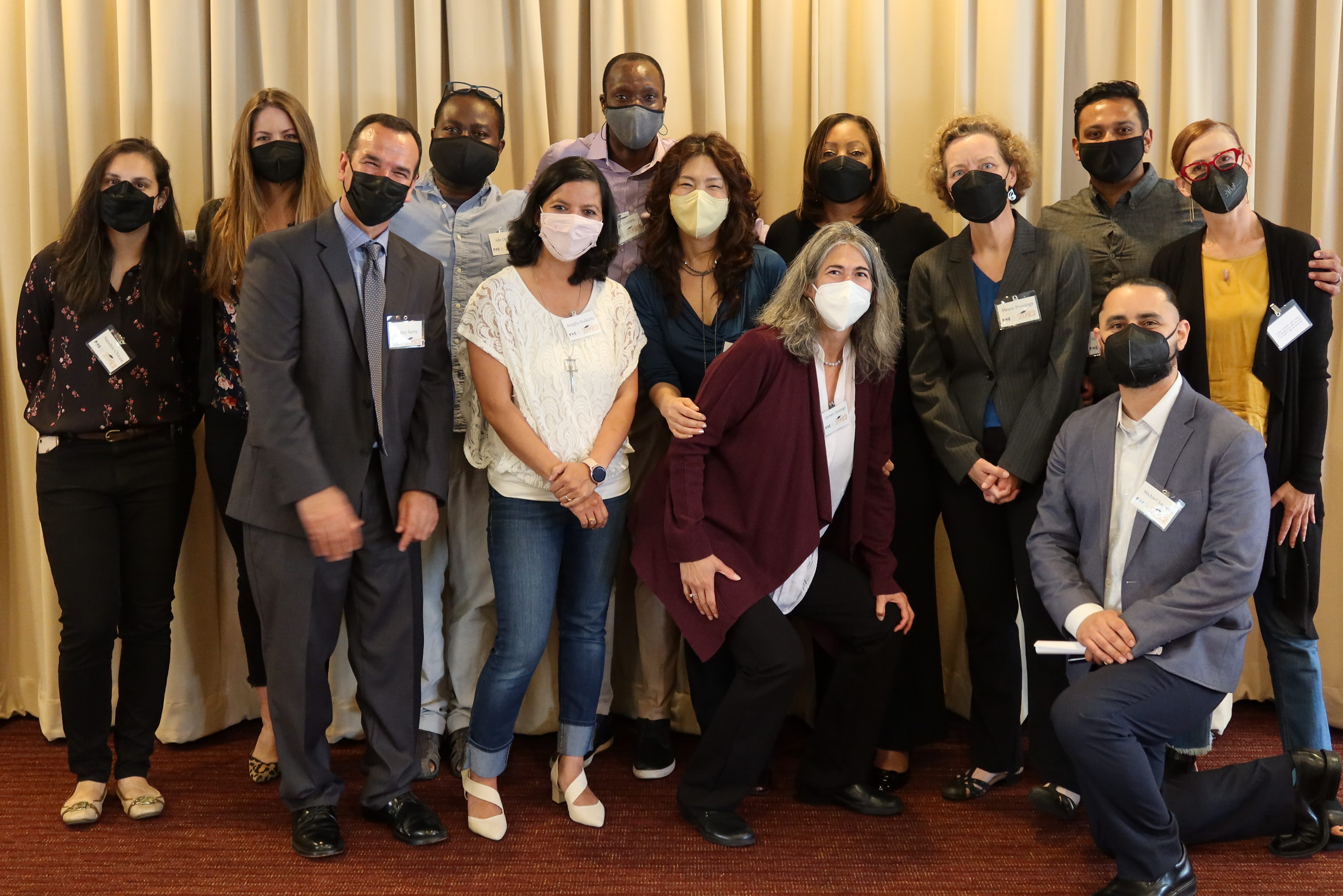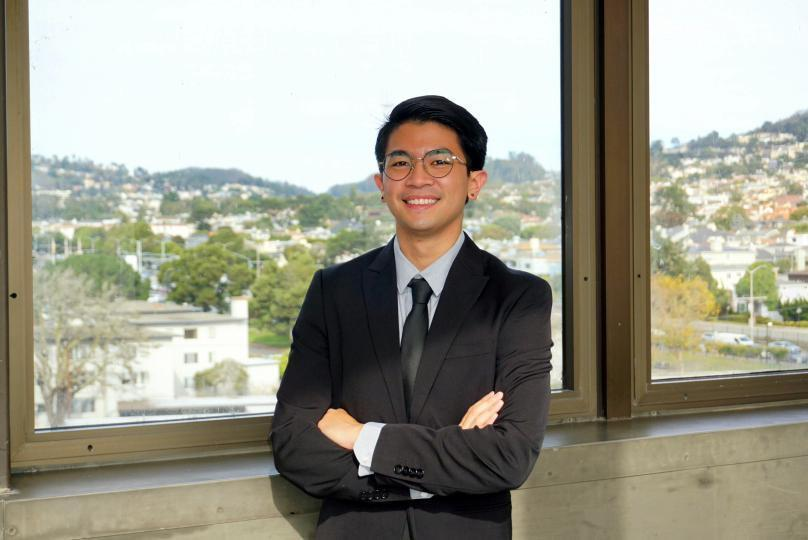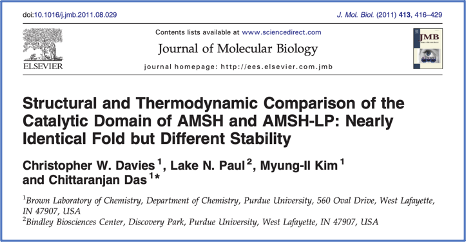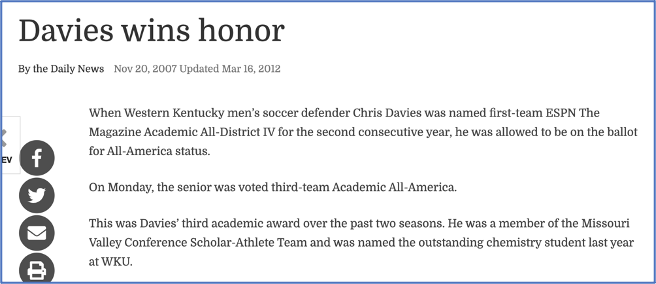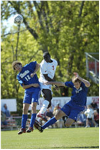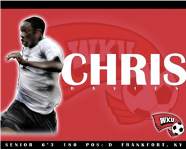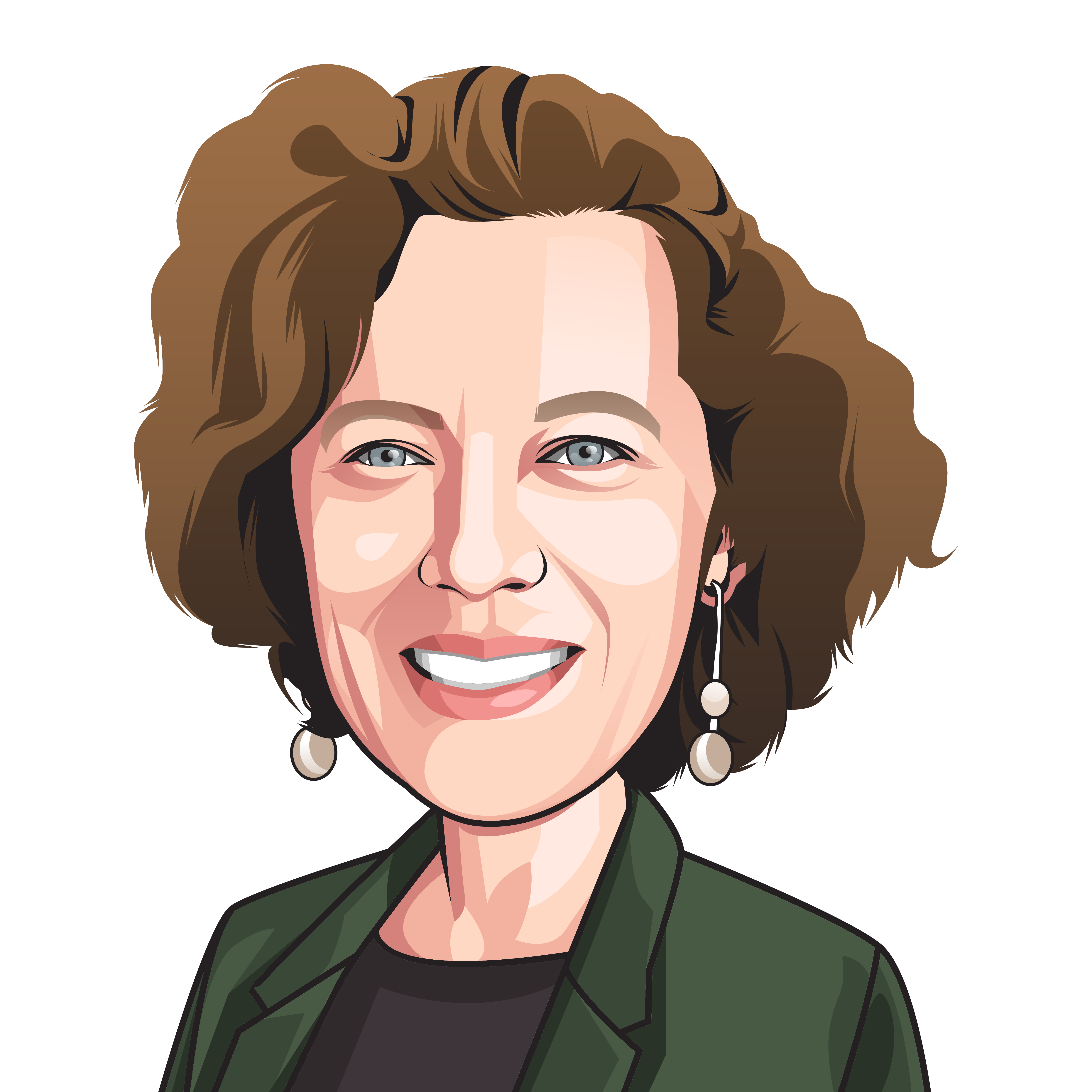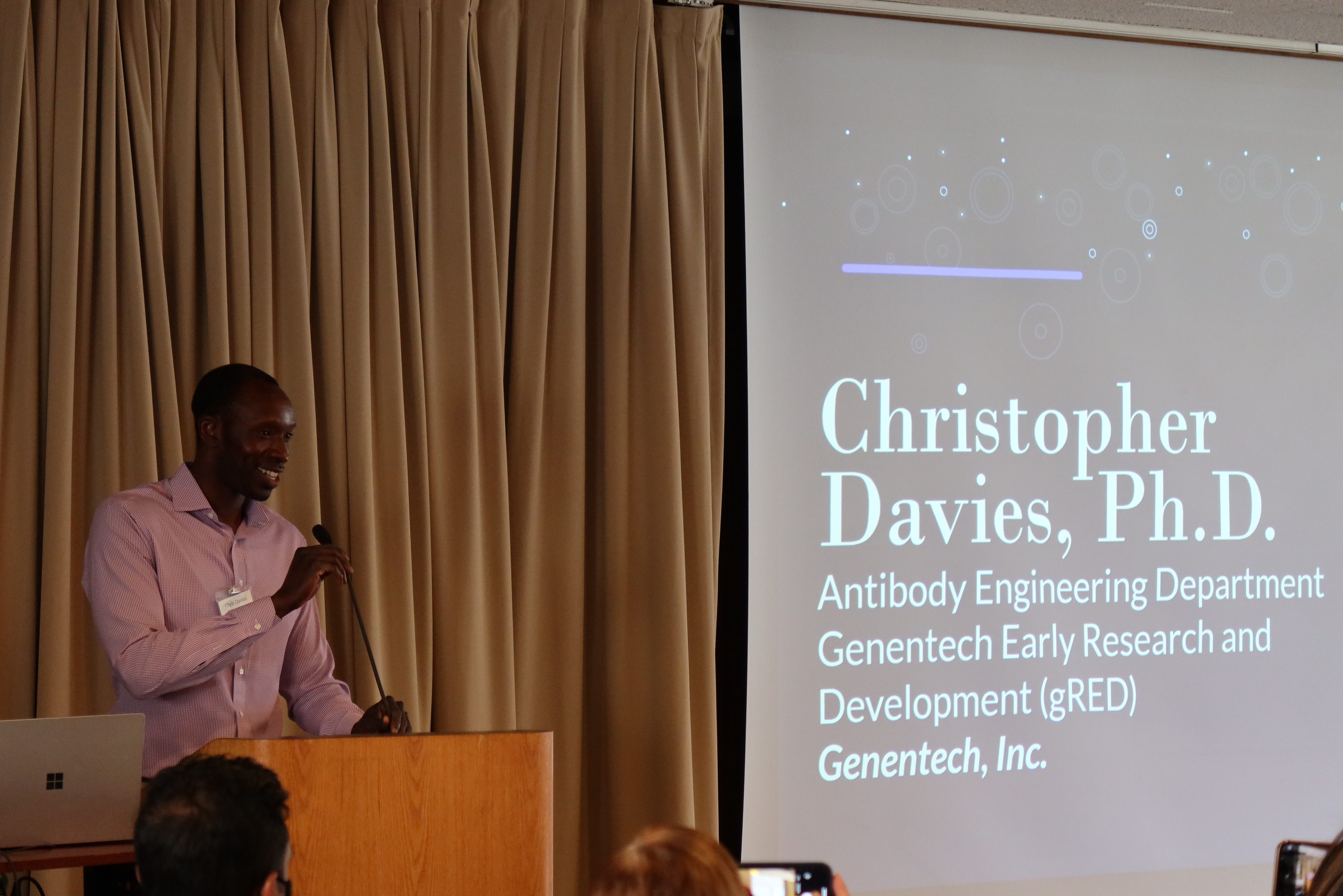
Chris Davies: “Today, we are here to recognize and celebrate these students who began, endured, and successfully completed the PINC, GOLD, or gSTAR certificate programs. I want to begin by saying congratulations and well done. Bringing together the fields of computing and data science with biology and chemistry is a pathway towards the future, that is now. The growth of technology to analyze large data sets, create applications, and the ability to code has never been more important in a generation than it is now. To the dreamers and organizers of these programs, I am happy to say your dream has come true amongst these students today.
For those of you that do not know me, my name is Chris Davies, and I am so honored to be here today speaking to you. My involvement in this celebration today arose from a vision that began with Joy Branford and Marlena Jackson at Genentech. A vision for change and opportunity. To change the face of STEM education, and to provide an opportunity to those that were not born into opportunity. My job at Genentech is to discover next generation medicines that change the lives of the patients that we serve. My job in life is to be Chris, a man that tries to make a difference in the lives of all the individuals that he encounters. I saw the gSTAR program as the opportunity that aligned perfectly with that job description. Alongside, my Genentech colleague, Chunwan, and SF State professor, Anagha, we envisioned a course that not only imparts knowledge to the students, but builds a bridge of life experiences that each student can walk across, allowing them to see and believe that they can achieve and aspire to similar or even greater levels. That vision became CSC 601, a seminar series course that outlined the drug discovery and drug development process from basic biology to post market approval, using current Genentech employees as guest speakers, whose jobs span the entire drug development process. Not only did the speakers talk about their job description and the role it plays in drug development, but also, each speaker outlined their life and career journey, emphasizing the successes, failures, and challenges that have led up to where they are at now.
The journey of a class and a scientist
Chunwan and I were the first “guest speakers.” We introduced the entire drug development process from start to finish. I have to say this was fun! Getting back into the classroom (albeit virtual) to engage with college students brought me back to my days in graduate school. We were able to set to tone and foundation for what was to come during the semester. Think about the timing and relevance of this course topic. We were and still are in the midst of the largest global health pandemic anyone has ever seen. The news was littered with information on the discovery and development of vaccines, followed by more information on vaccine and drug authorizations and approvals. What better way to engage with current events than to impart knowledge, but also make room for open discussion? Just like the rest of the speaker panel, we highlighted our life and career journey. A journey that included for me growing up in Kentucky to Sierra Leonean parents, who immigrated to the United States South in the embers of the Jim Crow era in 1973. A journey that included balancing life as a division I soccer player at Western Kentucky University with a chemistry major, mathematics minor, all while being heavily involved in undergraduate research. A journey that took me to Atlanta, GA for two summers for an internship at the Centers for Disease Control and Prevention (CDC), which opened the doors for me to pursue my doctoral degree at Purdue University in Indiana. A journey that led me to pack up my car to drive 2225.5 miles across the country to start a new life in Oakland, CA on a $39k postdoc salary at 26 years old.
As I sat through each class during the semester, I could see the level of engagement from the students and the impact each speaker was making as he or she described their journey and job. My favorite class of the semester was the last class, in which we held an in-person discussion session. I was blown away by the overwhelmingly positive responses and feedback from those that took 601. On behalf of all the guest speakers, I want to thank the 601 students for your willingness to allow us to take you along for the ride through our life and career journey.
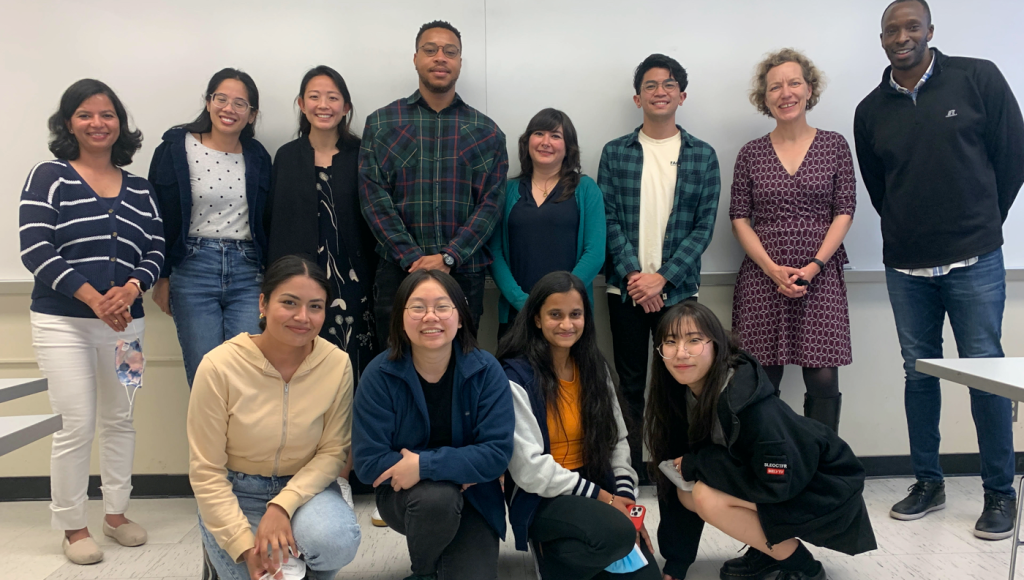
To the graduating students
That was a little bit about me, my involvement, and appreciation for the gSTAR partnership with SF State. For the second part of this speech, I would like to speak directly to you, students, because we are here to celebrate you and your achievement today. When I was asked to be the speaker at this celebration, I was overwhelmed with humility and honor that I would be entrusted with this responsibility. A responsibility to not only represent myself, Genentech, and the ones who were brave enough to ask me to talk and impart my ridiculousness, that some might call wisdom or encouragement. For those that know me, I love to talk, connect with people through stories, laughing, jokes, and through wrestling with life’s most challenging and deep topics. In order to collect my thoughts to ensure they were coherent, I first went to YouTube and searched for commencement speeches. I listened to speeches from Barack Obama, Oprah Winfrey, Denzel Washington, and Chadwick Boseman. Even this past weekend, I heard former NBA champion, Dwayne Wade, give Marquette University’s commencement speech. Each speaker used their life’s journey to impart wisdom to the graduates, in hopes to inspire them as they embark on their next steps. These individuals that I listened to need no introduction. These individuals have done extraordinary things in their lives that we continue to celebrate today, but let us not forget they all started out as people just like you and I. They had upbringings and experiences like many people in this room today, but what was it that separated them from the rest? Was it their talent, resilience, passion, desire, determination, hard work, belief, support system, opportunity, etc? The first thing I want to say to you is that you have to embrace your own journey, it isn’t about comparing yourself to other’s successes or failures, but try to take pieces of others experiences to help propel you on your own path.
There are four things that I have learned along my journey through life that I hope will help inspire you along your own life journey. I continue to live by and struggle through what these four things mean for me in each season of my life. This is an ever changing and ongoing process.
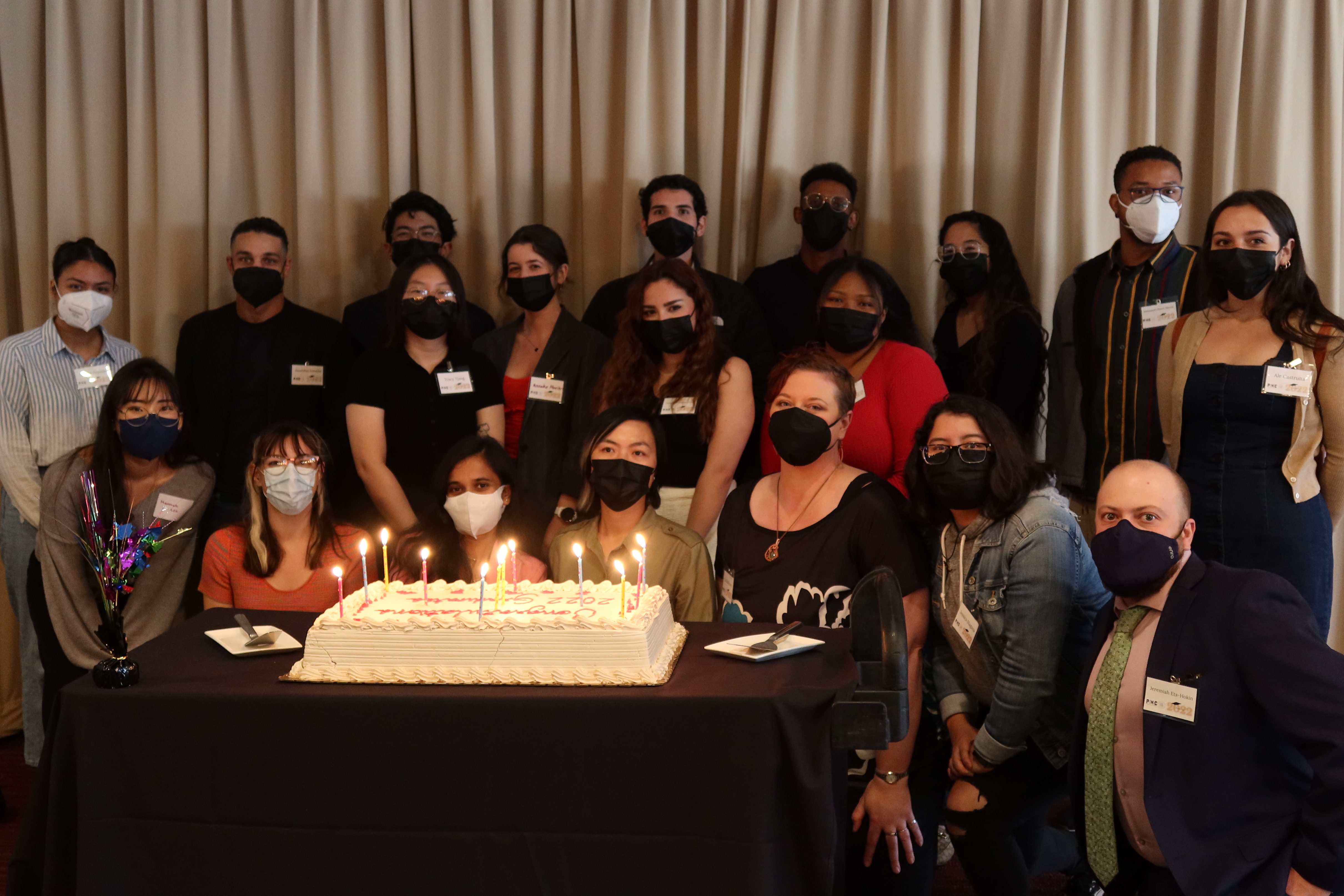
#1: Explore what brings you excitement and try to do those things
In school, I always did well in math and science, and my dad was/is a chemist, therefore, he pushed my siblings and I towards majoring in chemistry in college. Doing chemistry and working in a lab did not fit for my brother and sister, even though they did it to please my father. For me, once I started doing undergraduate research my second semester of college, chemistry became real for me. I enjoyed it! I learned so much working alongside my professor. I enjoyed getting results and analyzing data, all in pursuit of telling a story of what we think is going on. Soon I realized that working in the lab enabled me to travel all over the United States to go to conferences to present my data, talk to people, and continue to learn even more. Being at a conference opened the door for me to get an internship at the CDC, which exposed me to the world of proteins, biochemistry, but most importantly, that getting a PhD was possible for me. Obtaining a PhD open doors for me to come out here to do a postdoc at UC Berkeley, and then, transition to Genentech. The main takeaway is that it started with my openness to trying something new that ending up being fun and exciting. I had no idea that saying yes back then would lead me to me standing here in front of you today. What I do know is that doing stuff that excited me helped me to navigate the challenging and difficult moments along the way.
#2: Seek balance in your life
Following on from my first point about doing things that you are excited about. I grew up playing soccer since age 5. I played on travel teams, high school varsity, I was a division I soccer player, and I even played for a semi-pro soccer team while pursing my PhD. A typical weekday during graduate school consisted of working in the lab from morning until 5pm, and then, I would leave campus to go to the sports club to coach kids for 2-3 hours, before having my team training for another 2 hours. After practice, we would go eat around 10:30-11PM, and then, I would shower and go to bed to do it all over again the next day. Weekends consisted of playing games locally, or traveling as far as 4-6 hours for away games. As crazy as this schedule was, it brought the perfect balance in my life. When I was at school, I was focused on chemistry, when I left school, I was focused on coaching and playing. The main takeaway here is that seeking balance in your life is healthy and beneficial. I learned to be so much more efficient in my work, but also soccer gave me a release from school, and school gave me a release from soccer.
#3: Find mentors
This I believe is one of the most important things that I’ve learned along the way. Finding people that can help guide you along your path. You do not need people to give you step by step instructions, but you need a mix of people, a board of advisors, that you can lean on a times to help you navigate this journey called life. The key things about mentors are: (1) they do not have to look like you, (2) they do not have to be your friend, (3) they should be people who have your best interest in mind, (4) they should be individuals that challenge you to grow, and (5) they should be people who call you out equally as often as they praise and support you. These are people whose goal and desire is to see you reach your full potential, along your own journey. Sometimes these people are in your life for only a season, others across multiple seasons, but I encourage you to seek these people, be open to learning along the way, and continue to stay connected or in touch, even if it is only for a simple check-in or hello.
#4: Do not be afraid to be uncomfortable
I have found that growth and progress is uncomfortable. Some of my greatest successes and accomplishments stemmed from saying yes to stepping into, remaining in, and/or enduring uncomfortable situations and circumstances. The best example in my life was my decision to move out here. I was finishing my doctorate degree and I was still playing soccer, coaching, and I had a couple job opportunities, one in particular to work for my friend/mentor’s company. He painted the picture of learning directly from him in the area of pharmaceutical analysis, while continuing to play and coach soccer. He even proposed that I take over managing the soccer club. To put it simply, I thought this was my dream scenario to do science and soccer. Everything was perfect, I knew the area, the people, and I would still learn and grow in my career, however, there was one thing that held me back from saying yes, this would have been comfortable. I had one opportunity, a postdoc at UC Berkeley, that paid me less, in an area that I knew nothing about, without friends and family, but would be an adventure, especially since I was 26 at the time. I chose to move out here to the unknown instead of staying for the known. I would rather come out here and it not work out, than to be too afraid to try. It was uncomfortable adjusting to life in the Bay Area compared to the south and Midwest. It was uncomfortable having to start life all over again making new friends and learning new routines. It was uncomfortable paying $1100 for an apartment the exact same size as one that I only paid $500 for in Indiana. I had no idea at the time how my life would turn out, but that decision changed my life forever. Just think, I would not be standing before you here today. The main takeaway here is do not be afraid to be uncomfortable because you never know what can come out on the other side.
Dream big and do not be afraid
In closing, I would like to encourage you to dream big and do not be afraid. Congratulations on completing these programs and good luck with the next steps in the journey. Thank you for your time and this opportunity to speak.”
